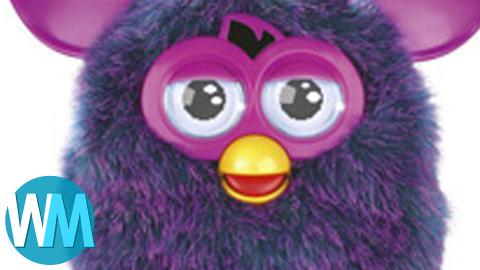Top 10 Everyday Items Banned Around the World

There are many things that are illegal in other countries that are legal where you live. Common products banned around the world include chewing gum in Singapore, blue jeans in North Korea, baby walkers in Canada and flip-flops in Capri, Italy. There sure are some strange laws around the world, and these banned products prove it. WatchMojo counts down ten everyday items that have been banned in certain countries.
Special thanks to our user Abellewis27 for suggesting this idea! Check out the voting page at http://WatchMojo.comsuggest/Top%2010%20Banned%20Everyday%20Items
Top 10 Everyday Items That Are Banned in Certain Countries
Top 10 Annoying Things That Should Be BANNED
You might use these products daily, but don’t take them for granted cause one day they might be illegal. Welcome to WatchMojo.com, and today we’re counting down our picks for the top 10 banned everyday items. For this list, we’re looking at seemingly run-of-the-mill objects that are used everyday by some people, but which have been banned by other governments or government organizations at some point in time. Please note: we’ve done our best to confirm that all of these bans are legit, but in some cases it’s possible they were either just in consideration, temporary or “strongly encouraged” guidelines.
#10: Furbies Banned by: The NSA
Remember these lovable robotic toys from your childhood? Well, you might be remembering them wrong, because these hamster or owl-like creatures went on to become less lovable. This is because of the Furbies’ almost human-like ability to start speaking English as they “grew.” Unfortunately, the National Security Agency came to believe that the pre-programmed English words the Furbies said were a result of their repeating words they heard. In 1999, this led the NSA to ban the toy from their headquarters in fear that it was also a recording device with the potential to repeat classified information in public. However, the ban was ultimately removed when this was revealed to be a myth.
#9: Game Consoles Banned by: China
Top 10 Emoji Innuendos to Up Your Sexting Game
In an attempt to stop what they felt were negative effects on their children’s mental and physical development, the Chinese government banned the sale of video game consoles in 2000. It was a nice effort, but consoles still came into the country through the gray market. It wasn’t until 2014 that the Ministry of Culture finally lifted the ban in the Shanghai Free Trade Zone, and allowed foreign companies, like Microsoft and Sony, to build their consoles. A year later, the ban was lifted nationwide. Video games themselves, though, are still restricted and need to be approved by the Ministry.
#8: Online Video Games Banned by: South Korea
Whereas China banned consoles, South Korea went a different way and struck at PC gaming, which is responsible for a large part of the country’s video game addiction. As part of the government’s effort to fight it, they introduced the Cinderella Law in 2011, which sadly has nothing to do with glass slippers and handsome princes, and more to do with ending your adventures at midnight. Also called the Shutdown Law, it blocks access to online games for people under 16, from 12am to 6AM. In 2014, the law was eased to allow parents to decide whether or not they wanted the law to apply to their children, which is a saving grace for you night owl gamers.
#7: Baby Walkers Banned by: Canada
In 2004, Canada officially banned this seemingly harmless tool for toddlers, following a 15-year voluntary ban on retailers. Seems like the device might not be so harmless after all, as baby walkers, meant to help babies learn to walk faster, can actually have the opposite effect and delay the process by two to three weeks. Then there are all those preventable injuries. Canada was the first country to ban walkers, and if you think you’d be able to get one secondhand, well that’s illegal too! If you’re caught with one, you could be fined up to $100,000 CAD or spend 6 months in jail. Yikes!
#6: Chewing Gum Banned by: Singapore
This ban was proposed in 1983, because gum was being used to vandalize mailboxes, high-rise apartments, keyholes, and elevator buttons. It wasn’t until 1987 that things got serious though, with people using gum on the new railway system, the MRT. Gum was used to block sensors and prevent doors from closing, which cost a pretty penny to repair. In 1992, the new Prime Minister put the ban into effect, and today the only gum allowed in Singapore is dental or nicotine gum, which is prescribed by a doctor. Being caught with gum can lead to a fine or imprisonment, and just spitting it out in public carries a $700 fine.
#5: Flip Flops Banned by: Capri, Italy
Flip. Flop. Flip. Flop. Sure, this sounds annoying, but folks on the Italian island of Capri took their annoyance to the next level and banned flip-flops altogether. The beach shoes fall under the category of ‘noisy footwear’, which isn’t allowed, under risk of a fine or arrest. So please, keep those clogs at home too! It’s one of many bans in Italy aimed at preserving public security. Building sandcastles, collecting seashells, playing ball games, kissing in a car, and wearing mini-skirts are all forbidden as well in different areas. Still, that probably won’t stop anyone from vacationing on Capri’s beautiful beaches.
#4: Blue Jeans Banned by: North Korea
Western culture may not always be the best influence when it comes to certain things, but who can argue with the utility and comfort of blue jeans? Well, Kim Jong-Un, that’s who. In an attempt to minimize the influence of Western fashion, North Korea’s leader banned blue jeans in the country. While it is a nationwide ban, it will primarily be enforced in the areas closest to the Chinese border, where American culture can sneak in. The ban also extends to ALL piercings, including ears. It might just be another day in North Korea, but to a democratic nation, the bans seem UN-believable.
#3: Kinder Eggs Banned by: The USA
Warning: this entry may contain small parts of nonsense and could cause a confusion hazard. Adult supervision required. The ban on Kinder Surprise eggs actually goes back to a 1938 Act that prohibits candy with a non-nutritive substance embedded in it to be sold in the USA. Thanks to possible choking hazards and the fact that they’re only suitable for children over 3 years of age, Kinder Surprises cannot be sold in the country. The eggs can’t even be brought into America, and fines are reportedly set at $300 to $2500 per egg. How’s that for a Kinder Surprise? While the US is the only country to have banned the chocolate, there have only been a reported 7 deaths worldwide from kids choking on Kinder since 1989.
#2: Doorknobs Banned by: Vancouver, Canada
Aside from paving the way for low flush toilets and LED light bulbs, Vancouver is also the first Canadian city to ban doorknobs. This has been done in the hopes that people won’t get stuck in whatever room they’re in, with levers being used to open doors instead. As of 2014, all new buildings have been built with levers instead of knobs, in an effort to phase out the old design. It is mainly meant to aid the disabled and people with arthritis, but also helps people who are older or are carrying things in their hands, like groceries. The ban was part of a bylaw to make housing more accessible, which also mandated bigger hallways, higher outlets, and wider staircases for possible stair lift installation. Before we unveil our top pick, here are a few honorable mentions: - Gambling Machines & All Electronic Games Banned by: Greece - Scrabble Banned by: Romania
#1: Ketchup Banned by: France
This ban might be the most baffling of them all. As of 2011, ketchup has been banned in school cafeterias in France. The reason for the prohibition, according to National Association of Directors of Collective Restaurants chairman Christophe Hebert, is to preserve French culture. Luckily, French fries aren’t a traditional French meal, so kids won’t have to suffer through eating plain potato sticks – which they can only have once a week. Hebert sees ketchup as too American, and wants children to learn native French recipes and pass them down to their kids. He also believes ketchup covers up the taste of their fine cuisine. Do you agree with our list? What are some other everyday banned items? For more illegal Top 10s published everyday, be sure to subscribe to WatchMojo.com.



